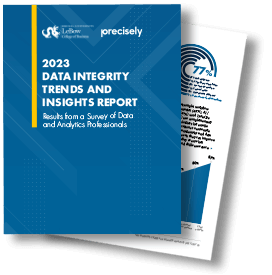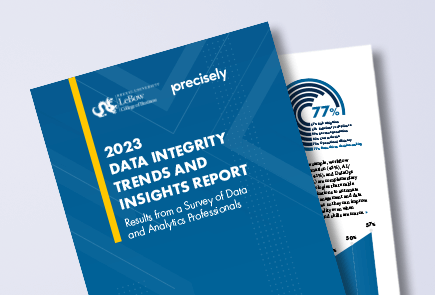
In Uncertain Times, Data Integrity is More Important Than Ever

The last several years have been a whirlwind. Regardless of your industry or objectives, you were likely impacted by macro forces that challenged you to pivot your business strategies like never before.
To name just a few of those trends and challenges:
- The COVID-19 pandemic disrupted consumer buying behavior, leading to a surge of 43% in e-commerce sales during 2020.
- This digital boom raised the stakes for cyber security and data privacy – and it’s easy to see why. Data theft, leaks, and breaches will cost companies an estimated $8 trillion in 2023. Regulatory and consumer scrutiny with respect to how companies manage personal data is on the rise.
- ESG and corporate social responsibility have become core enterprise requirements as organizations embrace greater transparency and accountability. In fact, more than 90% of S&P 500 companies now publish ESG reports.
- Unprecedented geopolitical instability – from Brexit to trade tensions to war in Ukraine to volatility in demand
During his keynote at Trust ’23, the annual Data Integrity Summit, Josh Rogers, Precisely CEO, discussed these challenges and more – and identified a common thread throughout: business agility is needed for organizations to tackle these issues head-on.
And technology is what helps you achieve that agility so you can not only survive, but thrive – building competitive advantage and driving long-term success.
Forward-thinking businesses invest in digital transformation, cloud adoption, advanced analytics and predictive modeling, and supply chain resiliency. They shore up privacy and security, embrace distributed workforce management, and innovate around artificial intelligence and machine learning-based automation.
The key to success within all of these initiatives is high-integrity data.
The Importance of Data Integrity in Uncertain Times
To better understand how businesses are adapting to the new normal, Precisely partnered with Drexel University’s LeBow College of Business to survey more than 450 data and analytics professionals from around the world about their current data programs and priorities.
During his keynote, Josh shared that the top five data program goals identified for 2023 are:
- Data-driven decision-making
- Operational efficiency
- Cost reduction
- Revenue generation
- Regulatory compliance
It’s no surprise that data-driven decision-making took the top position (77%) in the survey. When business users base their decisions on trusted data, they achieve greater business agility and better results for the other four top objectives. Trustworthy data that’s fit for purpose directly supports efficiency, cost savings, increased revenue, and compliance. This speaks loud and clear to the growing importance of data integrity – that’s data with maximum accuracy, consistency, and context.
That being said, it’s easier said than done. Typically, businesses generate data in siloed applications. Those silos make data hard to get at, so they bring it together in one place, but find that it’s not accurate. Even when hey clean up those mistakes, the data still doesn’t provide a complete picture, so they bring in external data to fill in the missing pieces.
It’s a complex process, but each step is essential in the data integrity journey – which ultimately fuels better, faster, and more confident decision-making that so many businesses are striving for.
Data Integrity Trends and Challenges
With those overarching goals in mind, let’s dive deeper into some of the biggest findings from the 2023 Data Integrity Trends and Insights Report – an important resource for your data integrity journey.
These results were covered during a panel discussion at Trust ’23, where Josh Rogers was joined by Precisely CMO, Kevin Ruane, and partners from LeBow: Diana Jones, Executive Director at the Center for Business Analytics, and Murugan Anandarajan, PhD, Professor of Decision Sciences and Academic Director, Center for Business Analytics.
2023 Data Integrity Trends & Insights
Results from a Survey of Data and Analytics Professionals

Here are some of the top takeaways that stood out to panelists.
Business needs and challenges
77% of respondents say data-driven decision-making is the top goal of their data programs – and they’re also looking to accelerate those processes.
Those who have already made progress toward that end have used advanced analytics tools that work outside of their application-based data silos. Successful organizations also developed intentional strategies for improving and maintaining data quality at scale using automated tools.
These innovators had three characteristics in common:
- A clear data strategy
- A formal data governance program
- A high level of data quality
The data strategy must be built with clear business outcomes in mind and must be shared across the entire organization so that key stakeholders have a common understanding of what to do, how it will be accomplished, and why it’s important.
Top trends influencing data strategies
When it comes to data management programs, 45% surveyed say that lack of effective data management tools is a barrier to success. There’s a strong desire for a more holistic approach to data management that includes comprehensive solutions with advanced capabilities, combined with continued need for human analysis and expertise.
Panelists pointed out that even in the face of budget constraints, companies accelerate the adoption of cloud technologies and launch digital transformation initiatives to increase flexibility while reducing costs. They also employ automation to maximize existing resources.
To that point, when asked about the top trends influencing their data strategies, respondents cited cloud adoption (57%), advanced analytics (50%), workflow automation (43%), digital transformation (42%), artificial intelligence and machine learning (41%), and DataOps (31%).
The biggest surprise? Data quality challenges
Data quality is crucial to overall data trust, but it’s a big challenge for many organizations – so big, in fact, that it was cited as the #1 challenge and the #1 priority for data leaders in 2023.
Data quality challenges aren’t anything new, but the team at LeBow was surprised to see just how pervasive it was to respondents – impacting things like executive support for data programs and the infrastructure needed to run them.
- Only 46% of respondents rate their data quality as “high” or “very high.”
- 51% say that a shortage of skills and staff are barriers to data quality
- 53% rank data quality as their top priority for improving data integrity

As organizations embark on data quality improvement initiatives, they need to develop a clear definition of the metrics and standards suited to their specific needs and objectives. That involves assessing the current state of their data quality and developing an improvement plan that includes:
- Data profiling
- Data cleansing
- Improving data literacy throughout the organization
- Rolling out formal data governance processes and technologies
Moving forward with confidence
Data leaders and decision-makers have been feeling the pressure. Impactful decision-making needs to happen fast, regardless of the macro factors that are impacting the business. Confident decisions need to be grounded in trusted data, which requires data integrity.
At Precisely, we’re the global leader in data integrity and the only company that can help you across that entire journey – from developing a data strategy to rolling out scalable data quality, eliminating data silos, and adding rich context through data enrichment and location intelligence. We’re here to deliver the capabilities you need, today and in the future.
Do the takeaways we’ve covered resonate with your own data integrity needs and challenges? Want to learn more about the importance of data integrity, and see how you compare to your peers across industries? Download your free copy of the 2023 Data Integrity Trends and Insights Report today.




